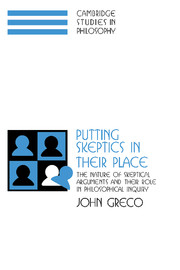 Putting Skeptics in their Place
Putting Skeptics in their Place Book contents
- Frontmatter
- Contents
- Preface
- 1 The Nature of Skeptical Arguments and Their Role in Philosophical Inquiry
- 2 Skepticism about the World: Part One – Reconstructions
- 3 Skepticism about the World: Part Two – Dismissive Responses
- 4 Skepticism about the World: Part Three – Dualism, Realism, and Representationalism
- 5 The Argument from an Infinite Regress of Reasons
- 6 Hume's Skepticism about Unobserved Matters of Fact
- 7 Agent Reliabilism
- 8 Agent Reliabilism and the Relevant Sense of “Relevant Possibility”
- 9 Moral and Religious Epistemology
- Bibliography
- Index
3 - Skepticism about the World: Part Two – Dismissive Responses
Published online by Cambridge University Press: 03 November 2009
- Frontmatter
- Contents
- Preface
- 1 The Nature of Skeptical Arguments and Their Role in Philosophical Inquiry
- 2 Skepticism about the World: Part One – Reconstructions
- 3 Skepticism about the World: Part Two – Dismissive Responses
- 4 Skepticism about the World: Part Three – Dualism, Realism, and Representationalism
- 5 The Argument from an Infinite Regress of Reasons
- 6 Hume's Skepticism about Unobserved Matters of Fact
- 7 Agent Reliabilism
- 8 Agent Reliabilism and the Relevant Sense of “Relevant Possibility”
- 9 Moral and Religious Epistemology
- Bibliography
- Index
Summary
We are finally in a position to consider dismissive responses to skepticism about the world. In Chapter 1 I defined “dismissive responses” as responses that either (a) do not engage skeptical arguments at all, or (b) engage them only superficially. Rather, such responses dismiss skeptical conclusions without paying serious attention to the reasoning that leads up to them. Because such responses fail to engage skeptical arguments seriously, they fail to locate the mistakes that the arguments actually make. This insures, in turn, that they miss the lessons that skeptical arguments can teach.
By definition, dismissive responses fail to engage skeptical arguments seriously. Type-a dismissive responses do not engage skeptical arguments at all but instead focus on some aspect, or alleged aspect, of the skeptical conclusion. Type–a responses fall into three categories: charges of self–refutation, pragmatic responses, and rhetorical responses. After considering these I turn to type-b dismissive responses, or responses that engage skeptical arguments only superficially. Here the focus is on two versions: (i) the charge that skeptical arguments assume that knowledge requires absolute certainty and (ii) the charge that skeptical arguments assume that knowledge requires deductive evidence. Finally, I consider transcendental arguments as dismissive responses to skepticism. Transcendental arguments can be type–a or type–b responses, depending on how they are understood.
- Type
- Chapter
- Information
- Putting Skeptics in their PlaceThe Nature of Skeptical Arguments and their Role in Philosophical Inquiry, pp. 61 - 76Publisher: Cambridge University PressPrint publication year: 2000


